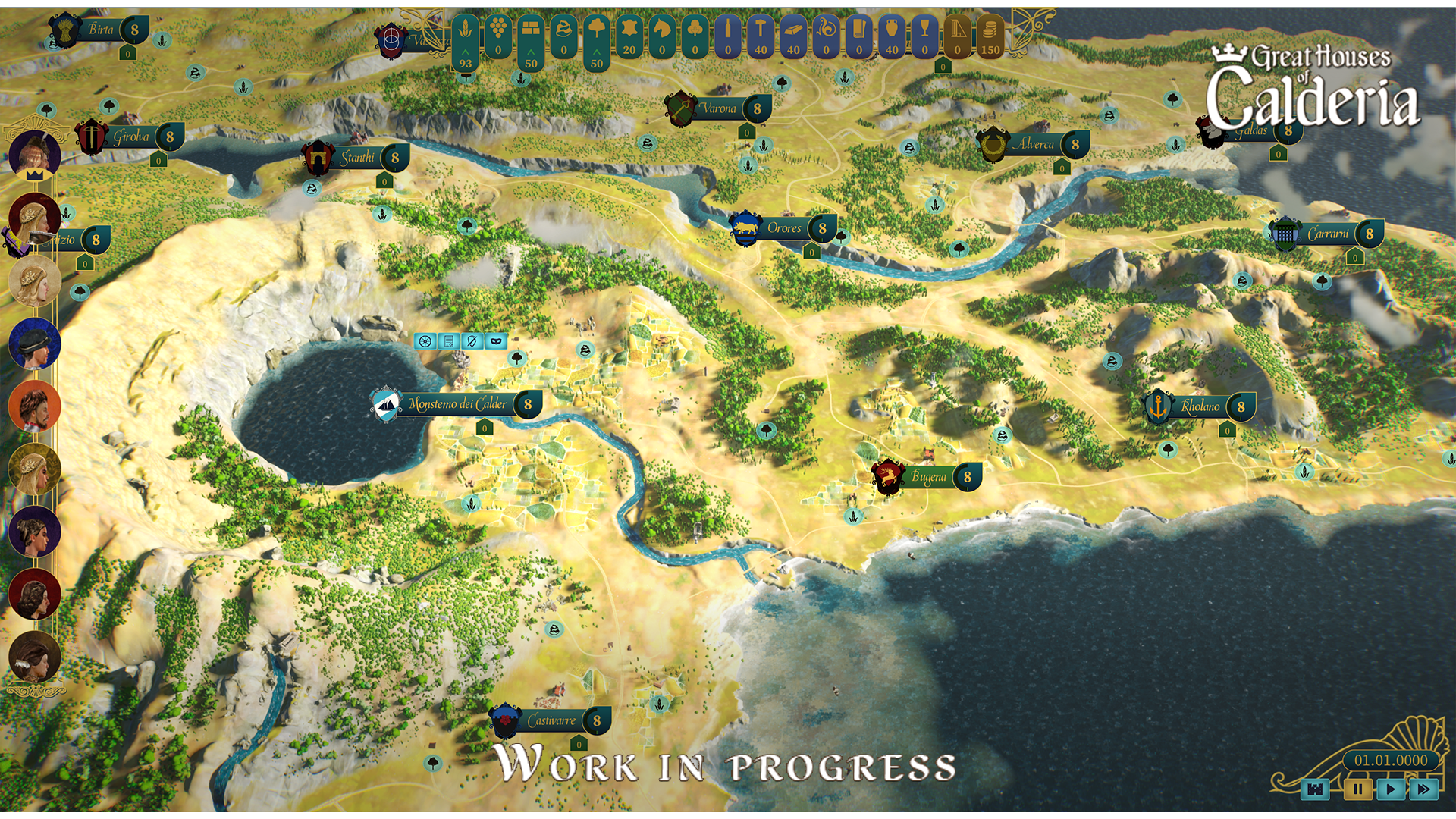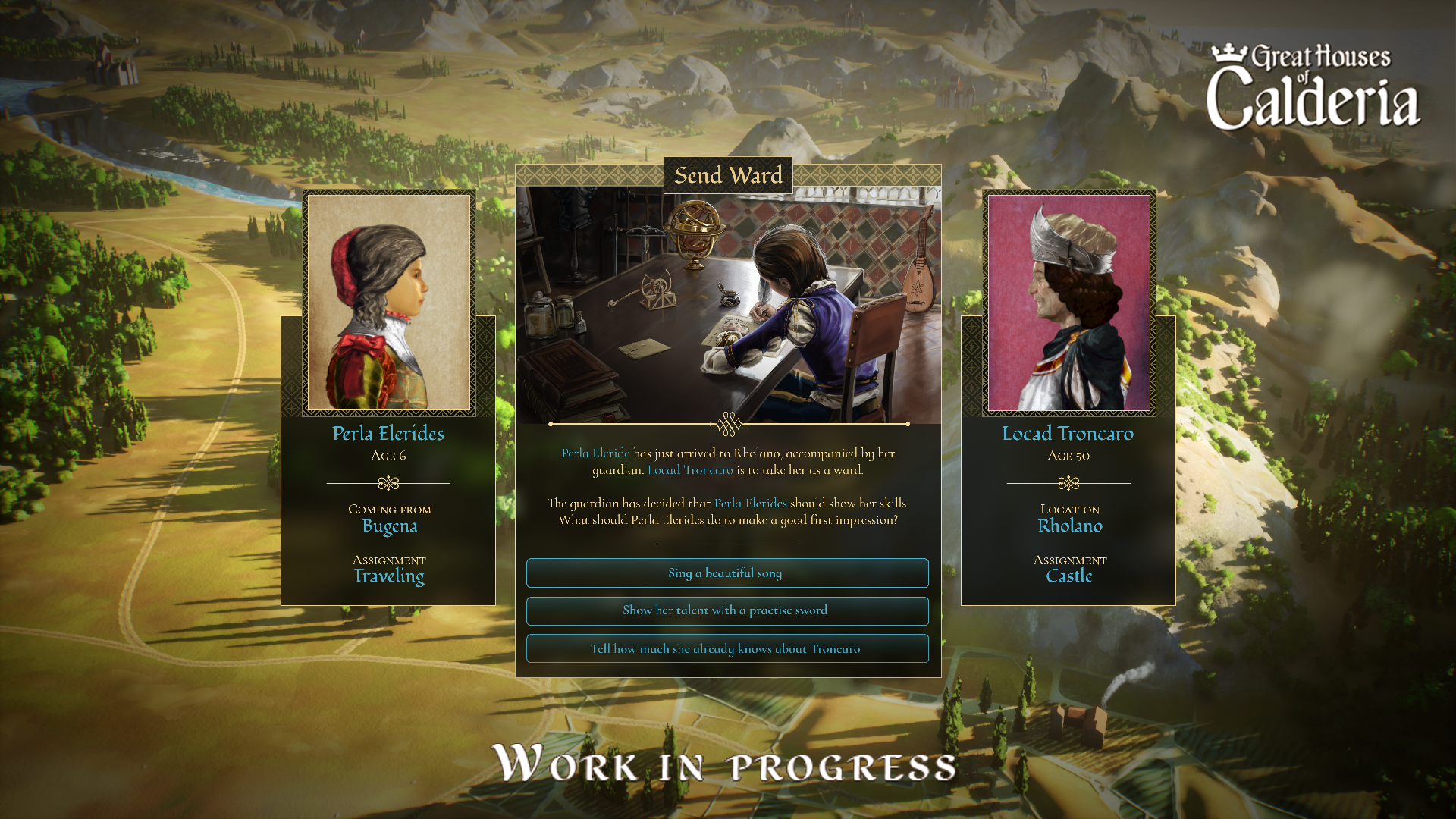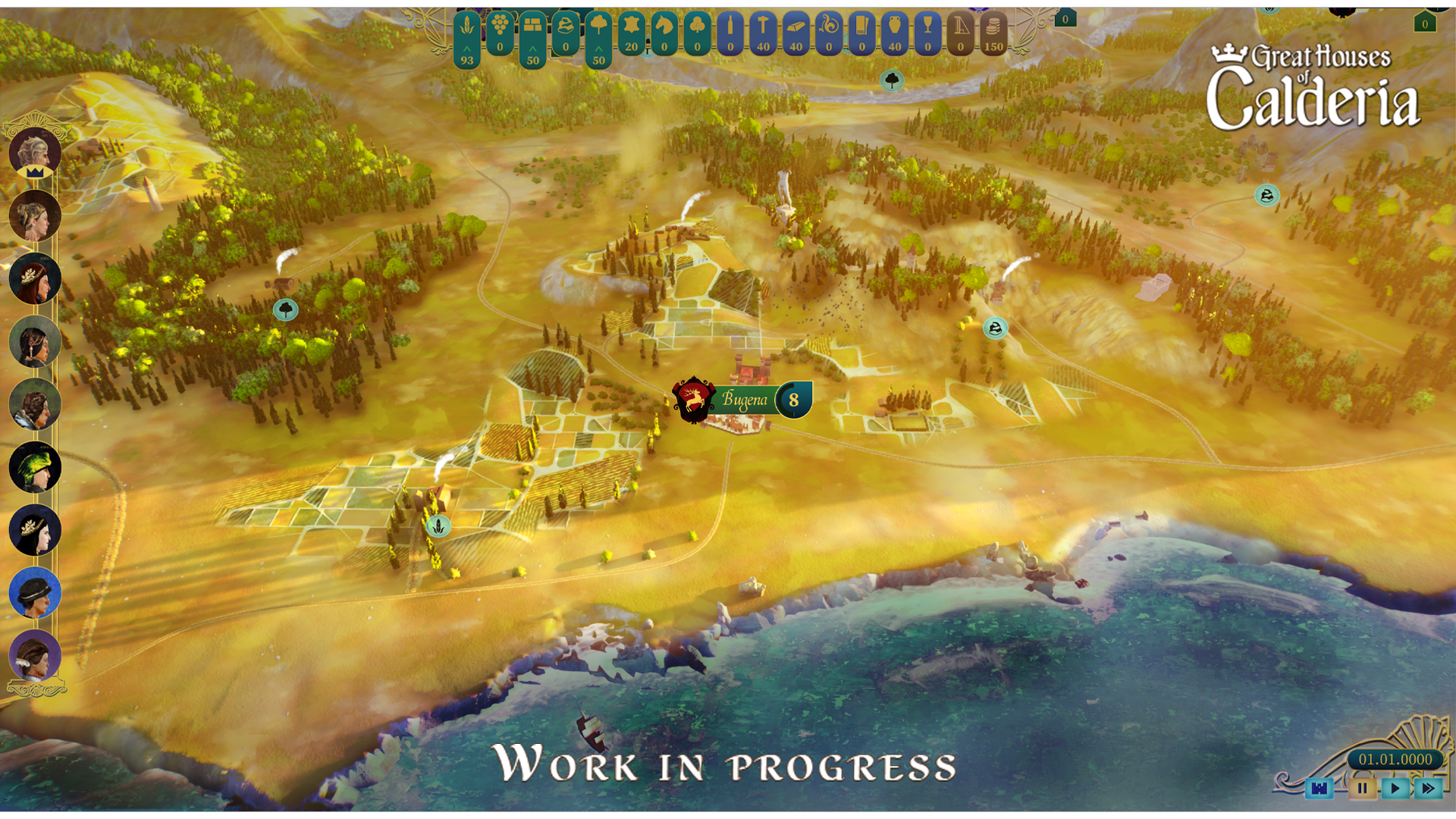The Crusader Kings series revolutionised grand strategy by switching the genre's emphasis from countries to characters, making wars and coups and religious schisms more tangible by filtering them through the lens of simulated humans. But a curious quirk of CK's design is that you rarely know precisely what those characters are doing. There's a gap between the social simulation and what happens on the campaign map, meaning your family members can move halfway across the world without you realising.
Where Crusader Kings only gives you the highlight reel of your character's experiences, Great Houses of Calderia plans to give you the live feed. This debut grand strategy by Finnish developer Resistance Games takes the broad structure of Crusader Kings but puts your family members directly on the map, tying your actions to their presence in the world.
"Whatever you do in the game, it will always be led by your family members," says Jussi Autio, the game director of Great Houses of Calderia. "If you want to trade with someone, you send your family members to lead the trade delegation. When you hire spies, one of your family members needs to do that. And when engaged in war, well, your family members will be the commanding officers."
Great Houses of Calderia takes place in a "low fantasy" world of Resistance's own devising, based heavily on the city-states of renaissance Italy, with "limited" magic that manifests primarily in Da Vinci-style gadgetry ("no fireballs," Autio says). Calderia itself is a subtropical volcanic island ruled by a larger kingdom from some unseen mainland, but ruled day-to-day by several rival houses, one of which you control.
Calderia isn't as expansive as Crusader Kings, taking place on a single island with around a dozen factions in play. You also only directly control a single "fiefdom," where you'll be able to build structures and produce various resources used to feed and maintain your subjects' happiness, as well as perform special actions. But this smaller scale is at the crux of Calderia's design. Resistance Games wants you to be intimately acquainted with everything going on across the island, rather than a tiny portion of it.
Central to this is your House's family members, who are involved in every facet of your daily operations, from passive activities, like overseeing production of resources, to more active jobs, such as negotiating trade deals or leading your forces in battle. Crucially, their movements and action are not just simulated in an abstract fashion but directly represented on the campaign map. Autio shows me an example of negotiating a trade deal with a rival house. To do this, your character must travel across the map to that house and then negotiate the deal themselves. Their character traits will influence the success of this deal-making. " So if I successfully start a trade [deal], the resources won't teleport. But there will be a trade route," Autio says. These trade routes are also simulated, and can be attacked by roving bandits or even hijacked by other houses.
As you only have a limited number of characters at any given time, choosing how best to deploy them will be a key part of Great Houses of Calderia's strategy. If you send one of your characters to be an advisor in a rival house's court, then you lose control over that character for other jobs. But you'll gain greater insight and intel into the workings of that house, opening up certain espionage actions to damage that house from within, such as sabotaging buildings or assassinating characters. You could also recruit a more generic spy unit to do these jobs for you, but they'll be less effective without the direct influence of a family member in the court.
The biggest gaming news, reviews and hardware deals
Keep up to date with the most important stories and the best deals, as picked by the PC Gamer team.

Yet while the family members of your House can be instructed like strategy units, they will not mindlessly obey your every whim. At various points in their lives, they'll depart on "character journeys," whereupon you'll lose control of them as they pursue key life goals. They might go adventuring through Calderia's fantasy world, become embroiled in a Romeo and Juliet-style love affair with a member of a rival house, or join a secretive cult of assassins to become a master murderer, like Arya Stark in Game of Thrones.
Autio explains that these journeys are designed not only to provide characters with some autonomy but also to help you "get to know who your family members are," and therefore how best to deploy them in the world. Journeying characters are not exempt from the rules of the world. They could be attacked by bandits or wildlife while on the road, or intersect with other houses in ways that alter your relationship with them. "If the character journey takes them to visit some other fiefdoms, then they might be influencing the relationship with that family as well," Autio said.
Indeed, relationships are a key mechanic of Great Houses of Calderia, not just between characters as seen in Crusader Kings, but between Houses as well. Alliances and rivalries between Houses are governed by a stat called "reputation," and your reputation can influence and be influenced by almost any action. Accepting a rival character into your court will boost your reputation with that House, which may give you a better chance of securing a trade deal or an alliance. If one of your family members botches a trade negotiation, you might still be able to force it through at the cost of some reputation with that House.

Rivalries with other Houses can come to a head in two ways. The first are battles, which are resolved through a unique boardgame like system that's a bit like playing two games of draughts at once. Each "board" represents a different "front" of a battle, such as in front of a castle wall, or a skirmish over a bridge. During the battle, units can be pulled from one front to reinforce another, while units that win on one front will gain stat bonuses before piling into the remaining front. "The conflict resolution model is [at a] five minute scale, what Total War's conflicts are in half an hour," Autio says.
Rather than simply drifting toward a conclusion, the final act of the game will see the island erupt in civil war between the Calderian Houses and its parent Kingdom
The other way you can square off with rival houses is through social conflicts. These represent non-military events that nonetheless have an element of battle to them, such as royal balls, tournaments, or even scheming in the back room of a tavern. The system governing social conflicts wasn't ready to show during Resistance's demonstration, but Autio explains it'll be broadly similar to the battle system, only you'll be trading witty rejoinders and scathing putdowns rather than ax blows. "The big, big difference is that some of the social conflicts can have more than two opponents," Autio says.
Alongside conflicts between individual houses, Resistance Games has big plans for Great Houses of Calderia's endgame. Rather than simply drifting toward a conclusion, the final act of the game will see the island erupt in civil war between the Calderian Houses and its parent Kingdom. Depending on your position, you could either support more powerful houses in their battle against the King, or lead the charge for the crown yourself. "We want that game to end with a big bang," Autio says.

I like the sound of Great Houses of Calderia. The character drama of Crusader Kings is my favourite part of Paradox's grand strategy, and I can see the potential in a game that folds them more neatly into its broader strategy layer. That said, while the scope of Crusader Kings is a big part of its appeal, what really makes it special is the depth to which it simulates its characters and their interactions, and it's hard to glean how well Great Houses of Calderia will be able to match up to that. At the time of the demonstration, Calderia's character traits had not been implemented. But Autio promises they are coming, along with "hundreds of events that will storify the mechanics."
Resistance also has some bigger long-term plans for how Calderia will let you shape the island and its history, from being able to name locations on the map that your house discovers, to ideas for an ambitious legacy system whereby a house you create in one playthrough will become an AI rival house that you play in the next. "We would love to add the names of the places to remain so that over several playthroughs, you would make the mythos of that island yourself," Autio says. He stresses that such features are contingent on Calderia's reception when it launches in Steam Early Access at some point next year.
I'm excited that a developer is attempting to build a grand strategy game in the Crusader Kings mould. While many games have been influenced by Paradox's revolutionary grand strategy, from Total War to Old World, nobody outside of Paradox has attempted to take the fundamentals of Crusader Kings' design and push in a different direction. It's a bold gambit from Resistance Games, and I'm fascinated to see how it all pans out.
Rick has been fascinated by PC gaming since he was seven years old, when he used to sneak into his dad's home office for covert sessions of Doom. He grew up on a diet of similarly unsuitable games, with favourites including Quake, Thief, Half-Life and Deus Ex. Between 2013 and 2022, Rick was games editor of Custom PC magazine and associated website bit-tech.net. But he's always kept one foot in freelance games journalism, writing for publications like Edge, Eurogamer, the Guardian and, naturally, PC Gamer. While he'll play anything that can be controlled with a keyboard and mouse, he has a particular passion for first-person shooters and immersive sims.

